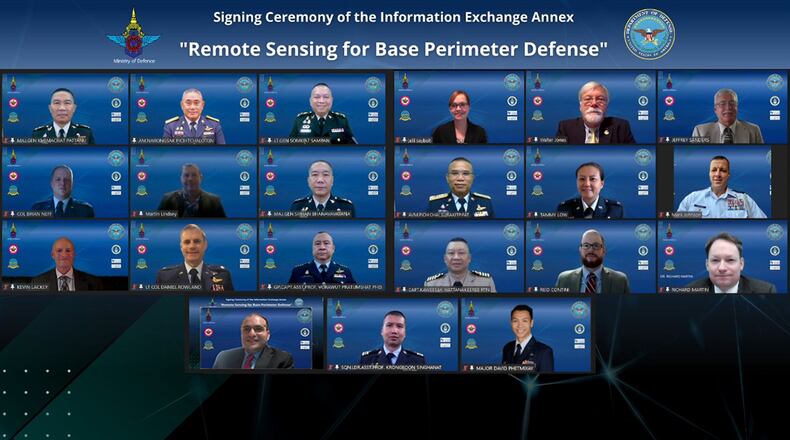“The primary area of mutual technical interests was development of a system and algorithm for human detection for base security, especially in situations where traditional measures such as video may not work well — like poor illumination or obscuration by foliage,” said Richard Martin, professor of electrical engineering at AFIT.
The agreement will allow both parties to advance the theory and testing needed for systems that can sense, detect and classify installation threats. Commercial off-the-shelf prototypes from both Thailand and the U.S. will be tested, and feedback shared.
Col. Ryan Thomas, an Air Force Academy professor at the time, saw the topic on a list of proposed research collaborations by Thailand. The project’s scope was similar to work he had done with Martin during a prior assignment as faculty at the Air Force Institute of Technology.
Martin and Thomas developed a prototype system, signal-processing model and imaging algorithm using a radio frequency wireless-sensor network for detection and tracking of humans, including through-wall situations. That research made the Thailand collaboration a natural fit.
“After meeting with my Thai counterparts recently, I am very excited to begin this collaboration,” said Lt. Col. Neil Rogers, senior military faculty at the academy and assistant professor of electrical engineering. “I believe we have much to learn from one another and can help move the state-of-the-art forward in high-priority areas of counter-unmanned aircraft systems research and base perimeter security.”
Martin added, “The Thai partners will bring valuable contributions, including an understanding of the effects of challenging outdoor environments on radio-sensor networks and an understanding of real-world tactical issues that need to be addressed for base-security applications.”
AFIT has a history of partnership with the Thai Ministry of Defence dating back to the late 1970s when four Thai students earned master’s degrees and four attended professional continuing education courses.
“We are delighted to partner with our colleagues in Thailand on this important work. This agreement will allow for cooperation in remote sensing and its application to perimeter defense and other key areas,” said Walter Jones, AFIT director and chancellor. “I look forward to working with our Thai partners for years to come.”
The next partnership steps are to share data sets and code to process that information and create images in order to replicate the findings and use it to propose alternate approaches.
About the Author
